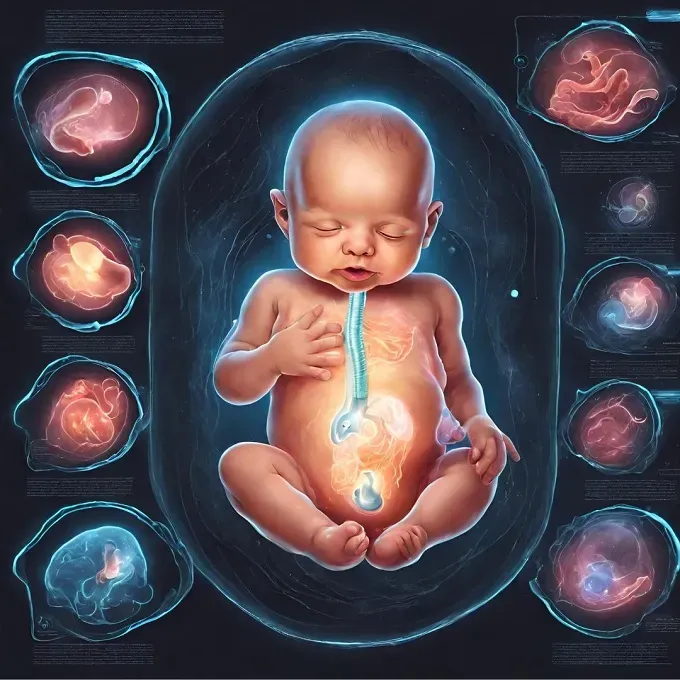The Impact of Epigenetics on Child Development: From Genes to Behaviour

Environment and Gene Expression
- Introduction
- The Impact of Epigenetics on Child Development: From Genes to Behaviour
- Epigenetics and Childhood Development
- Understanding Epigenetics
- The Basics of Epigenetics
- The Role of Epigenetics in Child Development
- Fascinating Mechanisms of Epigenetics
- DNA Methylation
- Histone Modifications
- RNA Transcripts and Their Role
- Delving into Molecular Basis
- The Importance of DNA Repair
- Techniques Used in Studying Epigenetics
- Structural Inheritance and Its Significance
- Consequences of Epigenetic Changes
- Impact on Brain Functioning
- Influence on Developmental Stages
- Transgenerational Effects to Consider
- Epigenetics and Personalized Learning
- Merging Epigenetics and Education
- Customized Learning Paths and Epigenetics
- Future of Epigenetics in Child Development
- Research Directions and Potential Discoveries
- How Can Epigenetics Further Personalize Education?
- Conclusion
Epigenetics and Childhood Development
 Epigenetics is a fascinating field of study. It has been gaining traction in recent years. It refers to changes in gene expression caused by external factors. It does not refer to changes to the genetic code itself. Our environment and experiences can shape how our genes are expressed. This can have a significant impact on childhood development. In this blog, we will explore some of the basics of epigenetics and its role in child development. We will also delve into some of the mechanisms that drive these changes, such as DNA methylation and histone modifications. Finally, we will look at how epigenetics could personalize learning and education for children. We'll also explore exciting new research directions. Join us on this journey through the world of epigenetics and childhood development.
Epigenetics is a fascinating field of study. It has been gaining traction in recent years. It refers to changes in gene expression caused by external factors. It does not refer to changes to the genetic code itself. Our environment and experiences can shape how our genes are expressed. This can have a significant impact on childhood development. In this blog, we will explore some of the basics of epigenetics and its role in child development. We will also delve into some of the mechanisms that drive these changes, such as DNA methylation and histone modifications. Finally, we will look at how epigenetics could personalize learning and education for children. We'll also explore exciting new research directions. Join us on this journey through the world of epigenetics and childhood development.
Understanding Epigenetics
Epigenetics is important for gene expression. It affects different biological processes without changing the DNA sequence. Scientists have studied this mechanism a lot. They have found that it is key to understanding diseases and human development. For example, Randy Jirtle has done important research. He explored how diet and the environment can change epigenetic patterns in model organisms. We can learn how genes are regulated by studying how histone modifications, DNA methylation, and RNA transcripts work together.
The Basics of Epigenetics
Epigenetics research focuses on studying chemical compounds and building blocks. They affect gene regulation. DNA repair mechanisms play a crucial role in maintaining epigenetic marks and gene regulation. The involvement of transposable elements also adds complexity to epigenetic gene regulation. These factors highlight the intricate interplay of various elements in this field.
The Role of Epigenetics in Child Development

Epigenetic regulation is important in prenatal neural development and early cognitive development. It controls gene activity. Where epigenetic marks are located affects gene regulation and genetic variation in cells. Epigenetic modifications in stem cells affect how they become different types of cells. This process is important for child development.
Fascinating Mechanisms of Epigenetics
Unlocking the intricate mechanisms of epigenetics reveals a world of awe-inspiring processes. DNA methylation and histone modifications are crucial for gene expression. RNA transcripts also play a vital role. Understanding these mechanisms reveals the intricate dance of molecular processes. They shape development and individual traits. It paints a fascinating picture of our genetic landscape. This exploration opens doors to personalized learning paths and potential discoveries. It paves the way for a brighter future in child development.
DNA Methylation
Methyl groups added to DNA sequences play a vital role in controlling gene function and activity. This change in DNA is called DNA methylation. It can greatly affect how genes are regulated in diseases like cancer and cardiovascular disorders. To understand how DNA methylation works in regulating genes, it is crucial to study DNA methyltransferases. Researchers in this field are making progress in uncovering the complex mechanisms of DNA methylation. They are also exploring its potential use in treating diseases.
Histone Modifications
Histone modifications, such as methylation, play a crucial role in gene expression and regulation. Similarly, histone acetylation influences the transcriptional activity and regulation of genes. Both acetyl groups and methyl groups are involved in modifying histones, which in turn impacts the activity and function of genes. Understanding these processes at a molecular level provides valuable insights into the intricate mechanisms of epigenetics. It also sheds light on its influence on gene regulation and expression.
RNA Transcripts and Their Role
RNA transcripts play a crucial role in gene regulation and function. Histone modification influences these transcripts. Epigenetic marks significantly impact RNA transcripts, which then affect gene activity. This shapes important genetic functions. Studying RNA transcripts provides valuable insights into the mechanics of gene regulation. It also reveals the complex influence of epigenetics on gene activity.
Delving into Molecular Basis
Epigenetics is the study of how genes can be affected by factors other than changes in the DNA sequence. DNA repair and structural inheritance are important processes in epigenetics. To understand how epigenetic changes affect development, it is crucial to study DNA repair mechanisms and the role they play. Similarly, exploring how structural inheritance impacts human genes can give us valuable insights into transgenerational effects. In the United States, researchers like Randy Jirtle have made groundbreaking discoveries about the influence of epigenetic changes on development.
The Importance of DNA Repair

DNA repair upholds genetic code integrity, influenced by epigenetic regulation. DNA methyltransferases contribute to prenatal neural development. Environmental factors impact DNA repair mechanisms, and certain compounds affect DNA methylation. Understanding the importance of DNA repair is crucial for comprehending how epigenetic processes interact with genetic factors. This understanding could offer new insights into diseases like breast cancer. Randy Jirtle and Robert Waterland have shown in model organisms that nutrition can affect the epigenome and result in disease phenotypes. This highlights the significance of DNA repair pathways in response to external stimuli and their impact on human genes.
Techniques Used in Studying Epigenetics
Studying epigenetic marks involves various techniques, including crucial research on histone modification. Understanding epigenetic gene regulation is essential for studying gene regulation. Additionally, analyzing environmental exposures aids in comprehending epigenetic regulation. Investigating specific DNA locations is necessary for studying epigenetic modifications. These techniques contribute to a deeper understanding of the complex mechanisms of epigenetics. They ensure continued progress in the field.
Structural Inheritance and Its Significance
Structural inheritance is important in epigenetics and affects early cognitive development. Understanding transgenerational effects is crucial because epigenetic marks can be inherited across generations. Maternal care has a big impact on epigenetic mechanisms in the first 36 months, which shapes how a child develops. Certain genes are regulated through epigenetics when cells divide. This shows how genetics and the environment interact in child development. This shows how structural inheritance shapes childhood cognitive and behavioural outcomes.
Consequences of Epigenetic Changes
Epigenetic changes refer to modifications in gene expression. They do not involve alterations to the underlying DNA sequence. Various factors such as diet, physical activity, and stress levels can influence these changes. They can have significant impacts on an individual's health and development, particularly during early childhood[4].
Early experiences can induce epigenetic changes that have lifelong impacts. For instance, the genes children inherit from their biological parents guide their development. These genes provide information. This includes their potential height and temperament. However, experiences during development can rearrange the epigenetic marks that govern gene expression. This can influence the child's health, behaviour, and achievement[1].
Difficult childhood experiences, like abuse or neglect, can greatly affect a child's development. In the early stages of life, the brain is highly adaptable and can be influenced by the environment. This affects the development of stress-regulating systems in the brain, such as the HPA axis. These negative experiences can cause changes in the brain's structure and chemicals, which can impact learning, behaviour, and overall health for the rest of a person's life.
Childhood trauma has been linked to changes in methylation patterns in human sperm. This might cause effects in future generations. This suggests that childhood trauma can affect subsequent generations[3]. The impact of childhood trauma may extend beyond the individual.
Moreover, epigenetic changes can increase with age. This suggests that the effects of early childhood experiences can persist and potentially worsen over time[2]. These changes can also affect various aspects of health. They include mental health, cardiovascular disease, diabetes, obesity, and cancer[8].
However, it's important to note that the effects of adverse childhood experiences don't have to be permanent. The idea of a "critical period" in which a brain pathway becomes fixed has been replaced by the "sensitive period" concept. This concept suggests there may be chances for intervention and recovery[8].
Early childhood experiences can cause epigenetic changes. These changes can greatly affect how a person grows and stays healthy. These changes may also be passed down to future generations. This shows why it's crucial to intervene early and provide support for children who face difficult conditions.
Impact on Brain Functioning

Epigenetic change affects brain function and cognitive abilities, impacting early cognitive development through its regulatory mechanisms. It also affects the different cell types in the brain and their gene expressions, playing a big role in brain development. Understanding histone acetylation is important for researching brain function and gaining insights into cognitive and neurological development.
Influence on Developmental Stages
During cell division, epigenetic regulation shapes gene expression and influences development stages. Postnatal care engages gene activity through epigenetic processes, and environmental factors play a key role in regulating gene expression during development. These modifications impact gene regulation in various cells, showing the significant influence of epigenetic changes on development, especially in muscle cells.
Transgenerational Effects to Consider
Investigating the role of transgenerational inheritance in shaping epigenetic processes offers a promising outlook for future research. Understanding the impact of genetic variation on transgenerational effects provides valuable insights into this complex phenomenon. Moreover, the significance of histone methylation in perpetuating transgenerational inheritance cannot be overstated. The passage of epigenetic marks across subsequent generations underscores the enduring influence of these processes. Notably, the demonstration of transgenerational inheritance across different cell types emphasizes the widespread nature of this intriguing phenomenon.
Epigenetics and Personalized Learning

Merging epigenetic advances with educational strategies holds promise for personalized learning paths. The intersection of genetic factors and environmental influences in learning processes is an area of growing interest. Understanding how human genes, model organisms, and cell cycle regulation interact with education can lead to innovative teaching methods. Randy Jirtle's pioneering work on DNA methylation and its impact on behaviour offers a glimpse into the potential impact of personalized learning. By exploring these connections, educators can apply epigenetic insights to help students reach their full potential.
Merging Epigenetics and Education
Understanding the intricate process of gene regulation is essential in merging epigenetics and education. Epigenetic mechanisms play a crucial role in personalized learning research, offering valuable insights into improving educational approaches. Investigating epigenetic changes holds promise for enhancing cognitive development within educational settings. Moreover, comprehending gene function is pivotal for integrating epigenetics into education, offering an optimistic future for personalized and effective learning paths.
Customized Learning Paths and Epigenetics
Tailoring education to suit individual learning needs has shown a positive influence on early cognitive development. Research in epigenetics indicates that customized learning paths could potentially impact gene activity. Enhancing our understanding of epigenetic mechanisms may lead to improvements in prenatal neural development. Moreover, combining personalized learning with postnatal care has the potential to shape gene expression. By optimizing education strategies based on epigenetic modifications, we can potentially enhance gene regulation and foster a more personalized approach to learning.
Future of Epigenetics in Child Development
Advancements in studying epigenetic mechanisms offer a promising future for enhancing child development. United States researchers, like Randy Jirtle, have explored how environmental factors influence genetic factors through amino acid modifications. Understanding these intricacies could lead to breakthroughs, such as innovative interventions for conditions like breast cancer, influenced by genetic and epigenetic interactions. Moreover, as research expands to model organisms and human genes, the potential applications of epigenetics in designing personalized interventions for children are becoming increasingly feasible.
Research Directions and Potential Discoveries
Studying epigenetic mechanisms can show how environmental factors affect gene activity. Exploring these processes in different cell types is important for understanding their role in controlling the human genome. Epigenetics research has the potential to help with mental illness and heart disease. It can lead to important discoveries and new ways of treating these conditions. As researchers learn more about epigenetics, they are hopeful about using this knowledge to improve personalized medicine.
Frequently Asked Questions Answered
What is epigenetic in simple terms?
Epigenetics, in simple terms, refers to changes in gene expression that are not caused by alterations in DNA sequence. It explores how environmental factors like diet, stress, and toxins can influence which genes are turned on or off. This study has far-reaching implications for human development, disease, and aging.
What are the top 3 influences for epigenetics in the human?
The top three influences for epigenetics in a human child are:
1. Nutrition: The diet of both the child and the mother during pregnancy can have a significant impact on the child's epigenetic marks. For example, the availability of certain nutrients can affect DNA methylation patterns, which in turn can influence gene expression and the child's development[2][4].
2. Environmental Stressors: This includes both physical and psychosocial stressors. Exposure to environmental toxins, maternal smoking during pregnancy, and even the mother's mental health can lead to epigenetic changes in the child. These changes can affect a wide range of outcomes, from stress response systems to the risk of developing various diseases[4][5].
3. Parental Behaviour: The behaviour of parents, including physical activity, smoking, and alcohol consumption, can also influence the epigenetic landscape of their children. For instance, paternal preconception diet and exposure to drugs and toxicants have been associated with epigenetic modifications in children[2][5].
How Can Epigenetics Further Personalize Education?
Epigenetics has the potential to revolutionize education. It does this by understanding gene regulation and environmental influences. By studying epigenetic marks in identical twins, we gain insights into personalized education. This research can lead to improved educational outcomes and customized learning paths.
These influences can lead to epigenetic changes that affect gene expression without altering the underlying DNA sequence, potentially having long-lasting effects on the child's health and development[1][2][3].
How does epigenetics affect gene expression?
Epigenetics plays a crucial role in gene expression by modifying the DNA molecule or associated proteins. Environmental factors can trigger epigenetic changes that can turn genes "on" or "off." These changes have long-term impacts on health and development, potentially leading to new treatments for genetic disorders.
How can we use epigenetics to improve our health and prevent disease?
Epigenetics offers insights into how our genes are influenced by lifestyle and environment. Making healthy choices can positively impact our epigenetic markers, reducing the risk of disease. A balanced diet, regular exercise, stress management, and avoiding harmful substances can all contribute to improved health. Future access to epigenetic testing may further personalize healthcare based on individual genetic makeup.
What should everybody know about epigenetics?
Epigenetics is the study of changes in gene expression without altering DNA sequences. It offers crucial insights. Environmental factors can influence epigenetic marks, impacting gene activity. Additionally, heritable epigenetic changes may contribute to disease susceptibility. This knowledge enables targeted therapies for various conditions.
What are some basic concepts of epigenetics in early childhood development?

Epigenetics is the study of changes in gene expression without altering the DNA sequence. It plays a crucial role in early childhood development. Environmental factors such as nutrition, stress, and toxins can influence epigenetic changes. These changes can have long-lasting effects on physical and mental health. Early childhood is a critical period for epigenetic development, shaping future health outcomes.
Conclusion
Epigenetics plays a crucial role in shaping childhood development and has far-reaching implications for health and education. Understanding the mechanisms and consequences of epigenetic changes is essential for creating personalized learning environments and optimizing children's potential. By delving into the molecular basis of epigenetics, we can appreciate the significance of DNA repair and explore the techniques used in studying this fascinating field.
Epigenetic changes have been linked to brain functioning, developmental stages, and even transgenerational effects. These insights provide valuable opportunities for tailoring educational approaches and designing customized learning paths that capitalize on individual strengths and needs.
As we look to the future, ongoing research and discoveries in epigenetics hold tremendous potential for improving health outcomes and preventing disease. By harnessing the power of epigenetics, we can further personalize education and unlock the full potential of every child.
To learn more about epigenetics and its implications for childhood development, get in touch with our experts today.
Citations:
[2] https://www.ncbi.nlm.nih.gov/pmc/articles/PMC3102328/
[3] https://www.ncbi.nlm.nih.gov/pmc/articles/PMC6857662/
[4] https://kidshealth.org/en/parents/about-epigenetics.html
[5] https://www.ncbi.nlm.nih.gov/pmc/articles/PMC9510910/
[6] https://www.nature.com/articles/s42003-021-02316-6
[7] https://www.ncbi.nlm.nih.gov/pmc/articles/PMC9705591/
[8] https://medicine.yale.edu/news/yale-medicine-magazine/article/the-epigenetics-of-child-abuse/
[10] https://www.thelancet.com/journals/lanchi/article/PIIS2352-4642(23)00106-2/fulltext
[11] https://www.sciencedirect.com/science/article/pii/S014976342100484X
[12] https://psychcentral.com/ptsd/epigenetics-trauma-ptsd
[15] https://www.ncbi.nlm.nih.gov/pmc/articles/PMC6748183/
[16] https://www.frontiersin.org/articles/10.3389/fpsyt.2022.925273/full
[17] https://developingchild.harvard.edu/science/deep-dives/gene-environment-interaction/
[18] https://www.cdc.gov/genomics/disease/epigenetics.htm
FAQ Citations:
[1] https://developingchild.harvard.edu/resources/what-is-epigenetics-and-how-does-it-relate-to-child-development/
[2] https://www.ncbi.nlm.nih.gov/pmc/articles/PMC3752894/
[3] https://www.cdc.gov/genomics/disease/epigenetics.htm
[4] https://www.ncbi.nlm.nih.gov/pmc/articles/PMC4207041/
[5] https://www.nature.com/articles/s42003-021-02316-6
[6] https://learn.genetics.utah.edu/content/epigenetics/inheritance
[7] https://medicine.yale.edu/news/yale-medicine-magazine/article/the-epigenetics-of-child-abuse/
[8] https://www.frontiersin.org/articles/10.3389/fnmol.2018.00292
Related Articles:
Understanding Neural Crest Formation: A High Level Review
Embracing Matrescence: A Journey of Growth and Change

Written with Augmented intelligence and Shiner the Human.






































































































































